"I Wasn't Planning on Competing Into 2021": 9 Olympians on How the Postponement Changed Everything
We were excited to watch the Olympics this summer. Come on: throw on NBC’s theme music and tell us you’re not foaming at the mouth to watch some archery! But then the games were postponed for a year, on account of the coronavirus pandemic. Tokyo 2020 is now Tokyo 2021.
While every athlete has had to put their life on hold as the world recovers, it's an especially cruel twist of fate for Olympic athletes, many of whom plan their lives to align perfectly with the games. Once every four years, small sports like swimming and track are suddenly huge, and athletes who have been putting in work in relative obscurity have a chance to compete in front of a worldwide prime-time audience—maybe end up on a Wheaties box. And now they have to wait another year.
If we were disappointed about the postponement, we couldn't imagine how they must be feeling, so we caught up with nine athletes reckoning with what this extended pause means. They've all responded to the limbo in different ways: some are energized by the freedom to focus elsewhere, others are using the extra time to continue honing their craft. Some are worried about losing their momentum, while one laments that he has to keep training for another year. Another spent an anxious week wondering if she was even still on the team. Here's where their heads are at, living (and training) in limbo, now 15 months away from their big moment.
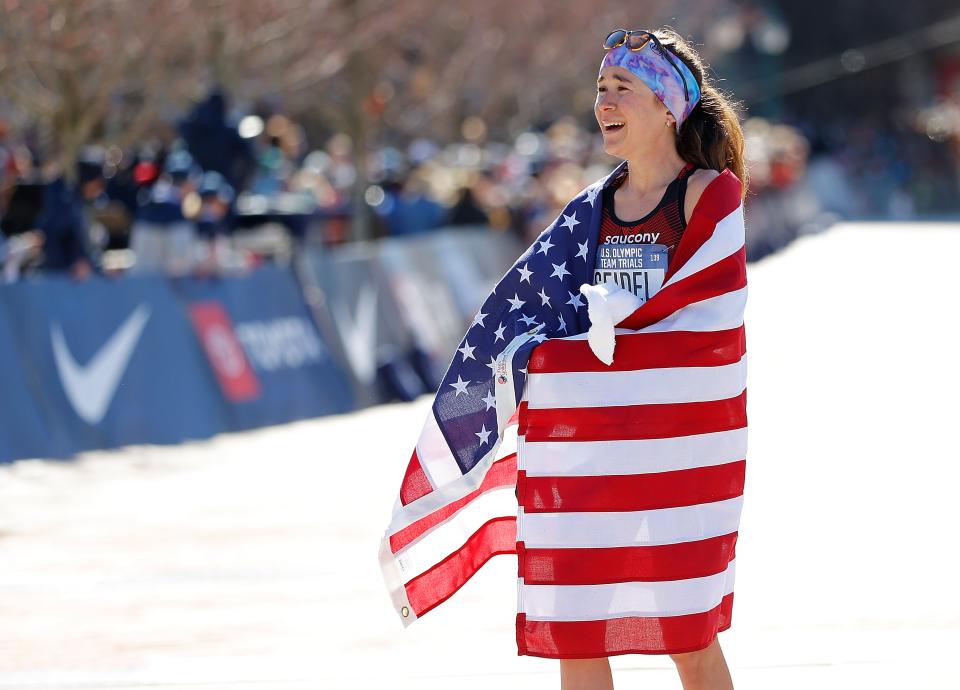
“You should not be on this team”
Molly Seidel, marathon
Seidel, 25, qualified for the marathon at the 2020 Olympics with a second-place finish at the U.S. trials at the end of February.
I’m not gonna lie: the last two weeks have been some of the most stressful I've ever had. We weren’t shocked when the decision came down, but it's obviously still disappointing. Then the conversation shifted to, "Oh, should these people who ran the marathon trials get to keep their spot? Should we re-run the trials?" There was definitely chatter online: the team that they're sending is not going to be the best team. I actually had a couple people DM me on Instagram straight-up saying, “you should not be on this team.” But they’re going to honor the result. We aren’t like other countries that choose their team with a committee where there's a lot of politics—there’s a reason we have a winner-take-all race.
The media really hopped on the idea that I was a barista before this. It was like, No, I’m a processional runner, I have a side hustle because Boston is expensive. Anyway, with all the restaurants shutting down, the cafe that I work at had to let most of their waitstaff go, including me. I am very lucky that I have my pro runner’s salary. It's not like a huge sports salary, but it's enough to live off—I have so much compassion for people, like many of my coworkers, that just have no income right now. But, yeah: I'm officially no longer a barista.

"The longest time in 20 years that I haven't fenced"
Alexander Massialas, fencing
Two-time Olympian Massialas, 25, won a silver and bronze medal in foil fencing events at the 2016 games.
Our usual training involves a lot of weights, like Olympic lifts to increase explosiveness, but at home there's only so much we can do. I don't have a dumbbell set or anything like that—I'm just doing bodyweight workouts, focusing on explosiveness, still do a lot of jumps and plyos. And, you know, playing a lot of video games. Luckily (or unluckily) I live on a steep hill in San Francisco, so my coach can tell me to run up that hill as many times as he wants. It's already been two to three weeks since I've gotten to the fencing club or did any sparring whatsoever. This will probably end up probably being the longest time in 20 years that I haven't fenced.
I haven't had any issues whatsoever with my sponsors, so I've been one of the lucky ones. I don't really have super high living costs and I'm in a reasonably good financial situation. But I definitely know fencers and other athletes that this is really tough for. They changed their whole life, especially this past year, and now they have to think about doing it all over again, and that puts them in a very financially uncertain position. The Olympic Committee is still paying training stipends, but I really hope there is a way for people to step up and help out. It's just an unfortunate time.

"I’m taking advantage of every year I can get."
Matthew Centrowitz, track and field
Centrowitz, 30, is the reigning Olympic gold medalist in the 1500 meters.
A few days after the official IOC announcement, I gave myself a solid week of unmotivated sitting on the couch, eating junk food, the whole off-season vibes. I did a 180 a few days later and ran 100 miles that week. Don’t tell the kids to do that. Now I’m getting back into normal training mode—85 miles a week. I’m based in Beaverton, Oregon, right across from the Nike Campus. Easy access to the trails. Most of my runs are with my roommate. We’re not training for anything specific. But there will be a day when there’s an Olympic title again.
Take it from a 30 year old: I’m taking advantage of every year I can get. There are so many theories out there—a miler’s prime is 24 to 26—but you can’t get caught up on that. I might be the oldest guy in the mile field, but maybe I’m the savviest, with the most experience.
I found myself at a younger age wanting to know from pros—what’s that one workout? There’s not one workout, it’s the consistency. Sometimes, it’s just me doing sit-ups in my bedroom, tucking my feet under the bed, coming out of the shower cranking out 50. Planks, bands—it doesn’t take much to make a home gym, doesn’t take much to strengthen the muscles you need. Hips, glutes, abs. I won’t disclose the hard track workouts I’m doing, though. Maybe when I’m retired.
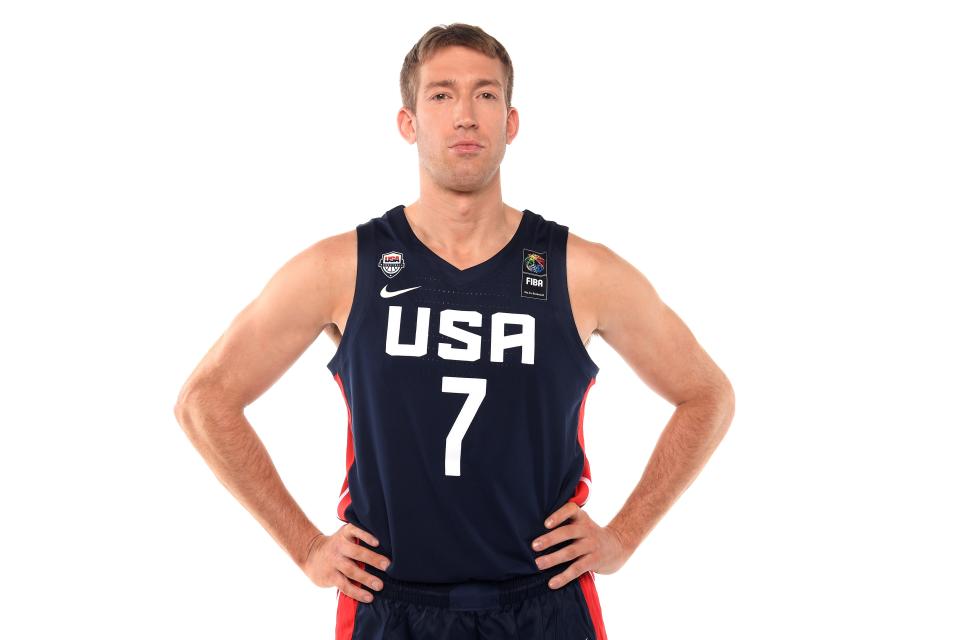
"I don’t think I’ve done jumping jacks since fifth-grade P.E."
Robbie Hummel, 3x3 basketball
Hummel, 31, is a member of the USA 3x3 team that won the 2019 World Championship, making his team the favorites for 3x3 basketball’s first year as an Olympic event. He’s also a TV commentator.
I didn’t go through any stages of grief. There’s nothing you can do about it and no way you can control this. If you get yourself worked up over this, it’s like, why? I can’t control what the coronavirus is doing or what countries are doing to respond to it. It’s not cancelled, it’s postponed. To me, nothing really changes, it just gets pushed back a year.
Last year I think I did 26 events for ESPN, 12 games for the Big 10 Network, and about 20 studio appearances. It was a lot of 6 a.m. workouts, and going right to a production meeting or a shootaround. I was definitely looking forward to getting back to normal next year and just doing my job.
I was talking to one of my buddies yesterday and I was like, man, the workout I did had jumping jacks in it. I don’t think I’ve done jumping jacks since, like, fifth-grade P.E. You can’t play basketball right now, but you can certainly do your part to stay in shape.
Now, I will say I had been really strict about my diet and I’ve relaxed that of late. I thought, I’m going to go crazy if I have to eat this strict diet right now. I have plenty of time to get that back on track.

Team USA Portraits For Tokyo 2020
"I was having the best swimming year of my life"
Kathleen Baker, Swimming
Baker, 23, won gold and silver medals at the 2016 games.
I was having the best swimming year of my life, and so this is a very, very hard time for me. My whole world has been flipped upside down—all of my purpose has been shifted and all the sacrifices I've made will be sacrifices for another year. Everyone's struggling with it in different ways. I woke up the last nine months with an immense amount of joy and purpose. And then when that just sort of gets put on hold and you're all of a sudden like, what am I doing with all this free time? I've started cooking and baking so much because I just don't even know what to do with myself.
But even though the Olympics are a year away now, you can't just take seven weeks off and expect to be ready to go once everything opens back up. So I’m being creative. I’m in San Diego, and I’m swimming in the ocean—I don’t want to say the beach, because we don’t want people congregating on the beach, but I can swim in the ocean without a group congregating. And then I also have access to a two-lane, 22-yard pool at a woman's house in La Jolla that she's letting us use. Her daughter does acupuncture for the team. Her mom is in her seventies, so we actually don't even see her—we just go into the backyard, swim for an hour and then get out. My boyfriend has a gym in his garage, so I can lift a bit.
And then...I just got a Peloton. That was quite a large purchase for me, but, I'm like, you know, it's an investment! Maybe even when I'm done swimming I'll still want to use the Peloton.
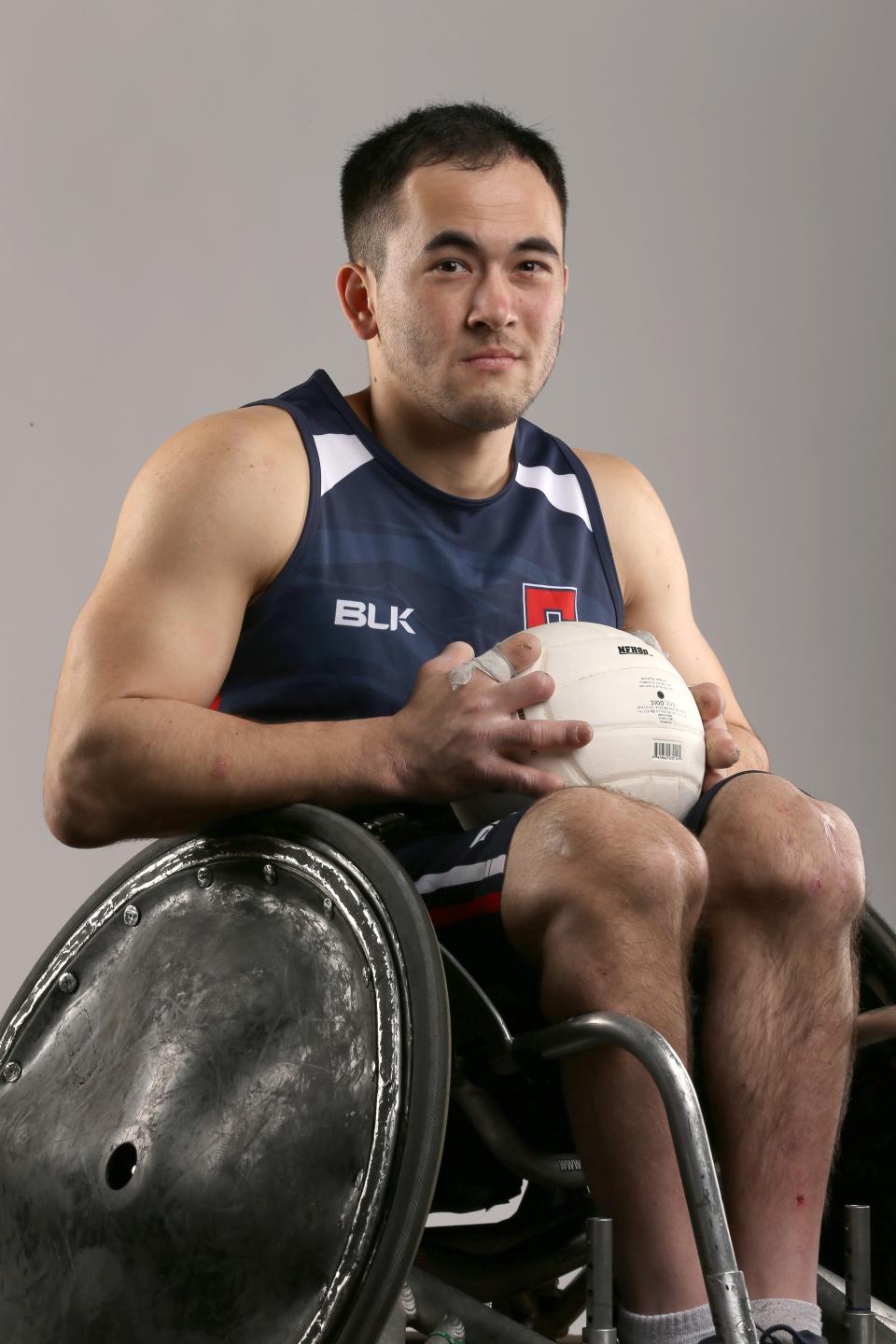
"I wasn't planning on competing into 2021"
Chuck Aoki, wheelchair rugby
Aoki, 29, won a bronze medal in 2012 and a silver in 2016.
I actually felt relief when they announced the postponement. Obviously there are a lot of emotions, but the first thing I felt was relief. My parents are older, my girlfriend is immunocompromised. I'm kind of immunocompromised. A lot of my teammates are at higher risk for this kind of thing. And so it was honestly getting to be really stressful. What if half the guys don't want to go?
It's forced me to readdress my own life a little bit. I wasn't planning on competing into 2021—I certainly was going to take that year off. But I committed to go to the Tokyo Paralympics and I'm going to Tokyo Paralympics, no matter when they are.
I'm a Ph.D student at the University of Denver, so I’m flexible, I can piece it together. But I don’t know fully what some guys are going to do. I hope we don’t lose anyone because of financial issues. I have teammates who are—they're okay. They're not like, destitute, but they're putting things together one week at a time. Not to be too cheesy about it, but we do this because we love this. There's nothing quite as great as representing your country and getting to compete and travel the world. But it’s going to be hard for some guys.

"You're kind of given a little gift"
David Boudia, diving
Three-time Olympian Boudia, 30, has won four medals, including a gold at the 2012 games.
It’s been two weeks that we have been out of training, so now it’s lifting at home and running and yard work and enjoying the quiet. We do have mats—diving needs a ton of repetition, and even doing a somersault on the ground helps your brain and body train a bit.
You're kind of given a little gift: what are the things we neglected to do that we can do now? You get to find two of those little details that you missed because you were getting down to the wire. I recently switched to the springboard and it's somewhat similar to platform but there's a lot of timing and rhythm issues when it comes to something moving under your feet. And so this postponement is going to help with that transition. This gives me another 15 months to hopefully fine-tune it.
Another thing: I think a lot of athletes neglect the mental side of training and because it's outside of the pool or playing field. But you can really focus on learning how to control your breaths when nerves do come. So that's doing breathing exercises or taking a second to close your eyes and think about the movements and really learning how to control your body. I think if athletes on Team USA would do that in the midst of the quiet, we’ll be way better off in 2021.
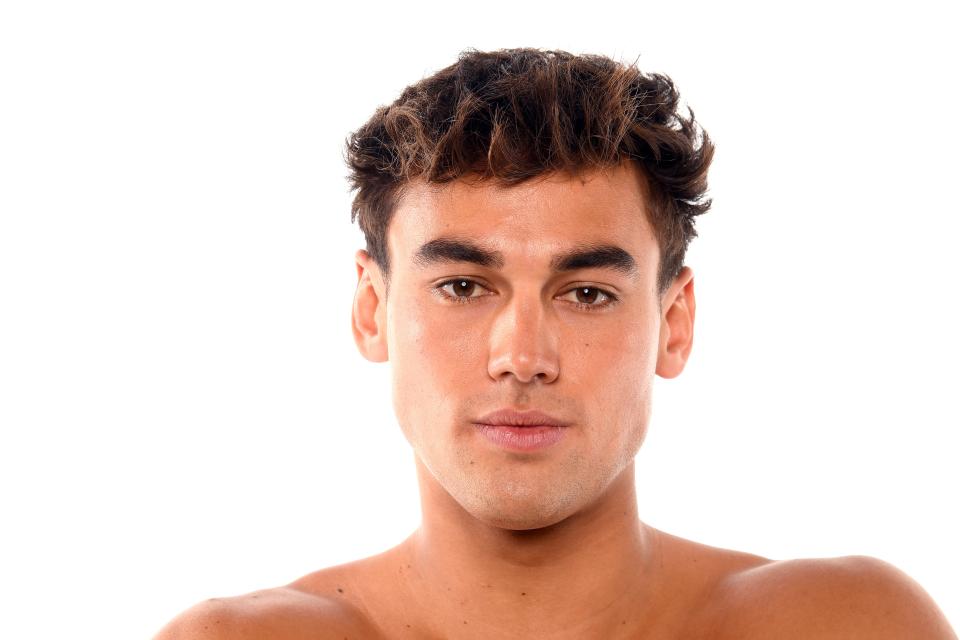
Team USA Portraits For Tokyo 2020
"You don't really know what day it is right now, right?"
Johnny Hooper, water polo
Hooper, 22, is preparing for his first Olympics.
The [Olympic] roster wasn't gonna come out until later this spring, but I had a pretty good idea. We won the Pan American games, which was the tournament to qualify us. After that you're maybe switching out one or two guys, but you're usually keeping a solid group together through that.
I’m living in L.A. with some roommates and I didn't have a home gym, so I went to [big-box sporting goods store] Big Five and got a bunch of gear: a bunch of different dumbbells, a bunch of resistance bands. It was good that I was quick: a couple of my buddies went to buy stuff on Amazon and the other websites that ended up completely sold out.
You don't really know what day it is right now, right? So it’s about staying on schedule and making your own little routines every day. When I wake up I have a smoothie and some pre-workout. Then I do the personalized workouts that our coaches are sending through an online program. I’m a more cardio-intensive player on our team, so I’m sprinting a lot.
The thing that's keeping me sane is studying, educating myself on things other than sports. I wouldn’t have time when I was coming home after a really long day of practice—I was eating and going to bed. But now I’m doing a lot of reading, and a lot of podcasts. One of my buddies, this guy named Louis Howes, has one called The School of Greatness, and I also like some music industry ones, like Rick Rubin’s. I love sports, and I’m doing that to go to the Olympics, but I have a lot of other interests as well, you know?
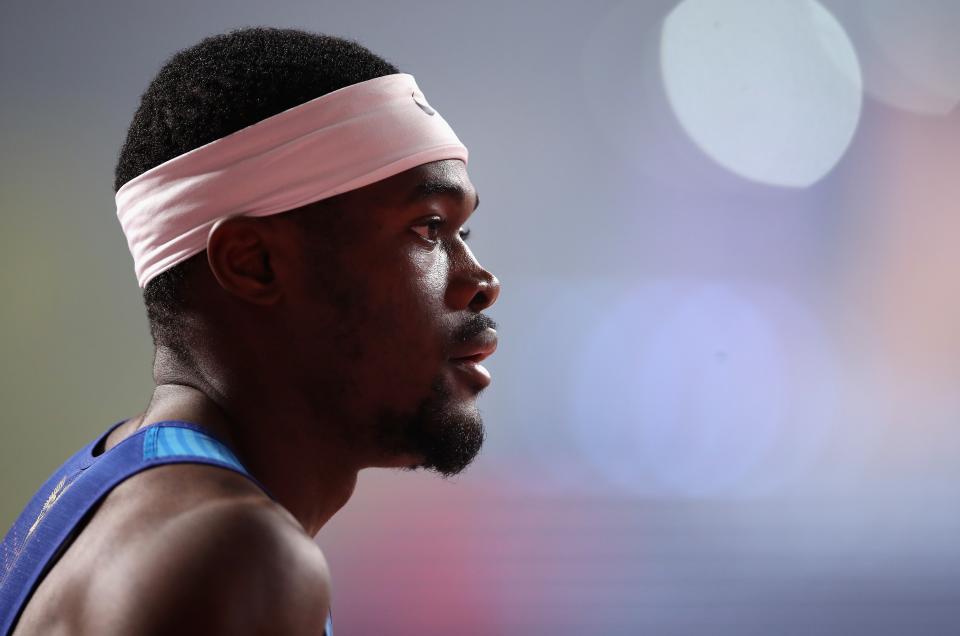
17th IAAF World Athletics Championships Doha 2019 - Day Four
"Why am I doing this right now?"
Rai Benjamin, track and field
Benjamin, 22, is preparing for his first Olympics.
At last year’s World Championships I was able to medal in both the 4 x 400 relay and the 400 hurdles. That was a whole trial and tribulation in itself, but now preparing for these Olympic games I was locked in. And now I've had to ask myself like, all right, what's your motivation? Like, why am I doing this right now? And it's kind of heartbreaking to have no end goal in sight for right now. It’s like, do I just relax and start over again in July? Because it's just really unclear as to what's going to happen.
But I have to maintain a certain level of fitness so that when it's time for me to get back on the track I'm able to do the best I can. All the tracks are closed—it’s like being a carpenter without any building materials. We're doing our workouts in the street. Yesterday we were at a dead end, and our coach marked off 300 meters, like with a wheel you might get a Home Depot. People were walking their dogs and cheering us on, asking us questions. It was sort of like a movie, with kids running in the street after some professional athletes. You can kind of see that they get a little inspired by the fact that like, you know, like, hey, you guys are Olympic athletes, and you're here still working out. We’re keeping the dream alive.
They’re sold out everywhere. How complicated could it be to just make some more? Turns out, very.
For our money, he's the best Bond yet—a searching soulful actor who managed to turn the campy secret agent into a three-dimensional character. Now as the world gears up for Daniel Craig's final film as 007 nears, he offers some rare reflection on the franchise he redefined and the icon he reimagined.
Originally Appeared on GQ


